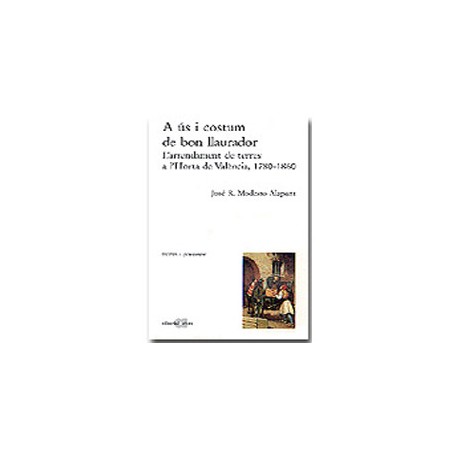No products
Prices are tax excluded
Product successfully added to your shopping cart
There are 0 items in your cart. There is 1 item in your cart.
A ús i costum de bon llaurador. L’arrendament de terres a l’Horta de València (1780-1860)
978-84-86574-63-5
New
A ús i costum de bon llaurador. L’arrendament de terres a l’Horta de València, 1780-1860
In Stock
|
author Modesto Alapont, José R. |
|
More info
1998. Pròleg de Jesús Millan, 328 pp.
The role of agriculture in the economic development of Valencia in the 19th century was very important. In this process, one of the issues that needs to be taken into account is the relationship between the peasant family and the land owners. With regard to the specific case of L’Horta in Valencia, the transfer of the land in lease, together with the credit and a possible control of the marketing mechanisms, allowed the stable cultivation of the land and the application of the amount of work and technical knowledge required for intensive polyculture. This made short-term leasing, which income could be reviewed periodically, the economically most profitable formula of exploitation. And this is where the conflicts arise between the tenant and the owner, the resistance of the first against the interest of the second. Precisely, this resistance is the cause, in part, that from the last three decades of the 19th century the tenants became owners of the lands. Modesto Alapont studies this whole process in three fundamental aspects: the evolution of land income during the late years of the old regime and the first half of the 19th century, the relationship between landlords and settlers, and the economic changes operated in this relationship during the different economic junctures of the period 1760 – 1860. Although Use and Custom of a Good Farmer focuses on the case in L’Horta, its conclusions are revealing to understand the process in other places in the Catalan community.
Reviews
No customer reviews for the moment.




